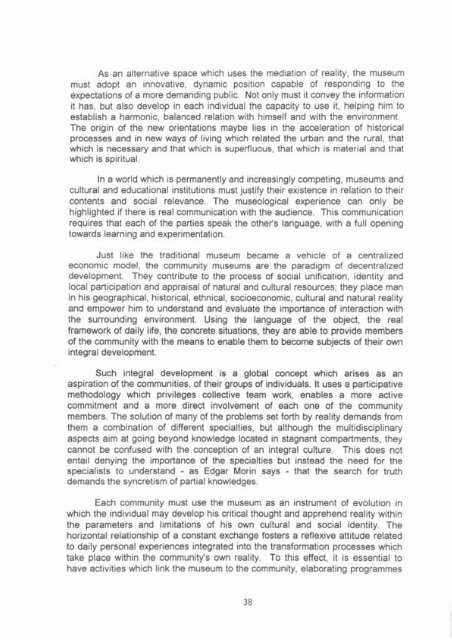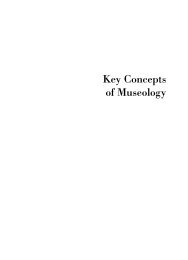ISS 25 (1995).pdf - The International Council of Museums
ISS 25 (1995).pdf - The International Council of Museums
ISS 25 (1995).pdf - The International Council of Museums
You also want an ePaper? Increase the reach of your titles
YUMPU automatically turns print PDFs into web optimized ePapers that Google loves.
As an alternative space which uses the mediation <strong>of</strong> real ity, the museum<br />
must adopt an innovative, dynamic position capable <strong>of</strong> respond ing to the<br />
expectations <strong>of</strong> a more demanding public. Not only must it convey the information<br />
it has, but also develop in each individual the capacity to use it, helping him to<br />
establish a harmonic, balanced relation with himself and with the environment.<br />
<strong>The</strong> origin <strong>of</strong> the new orientations maybe lies in the acceleration <strong>of</strong> historical<br />
processes and in new ways <strong>of</strong> living which related the urban and the rural , that<br />
which is necessary and that which is superfluous, that which is material and that<br />
which is spiritual.<br />
In a world which is permanently and increasingly competing, museums and<br />
cultural and educational institutions must justify their existence in relation to their<br />
contents and social relevance. <strong>The</strong> museological experience can only be<br />
highlighted if there is real communication with the audience. This communication<br />
requires that each <strong>of</strong> the parties speak the other's language, with a full opening<br />
towards learning and experimentation.<br />
Just like the traditional museum became a vehicle <strong>of</strong> a centralized<br />
economic model, the community museums are the paradigm <strong>of</strong> decentralized<br />
development. <strong>The</strong>y contribute to the process <strong>of</strong> social unification, identity and<br />
local participation and appraisal <strong>of</strong> natural and cultural resources; they place man<br />
in his geographical , historical, ethnical, socioeconomic, cultural and natural reality<br />
and empower him to understand and evaluate the importance <strong>of</strong> interaction with<br />
the surrounding environment. Using the language <strong>of</strong> the object, the real<br />
framework <strong>of</strong> daily life, the concrete situations, they are able to provide members<br />
<strong>of</strong> the community with the means to enable them to become subjects <strong>of</strong> their own<br />
integral development.<br />
Such integral development is a global concept which arises as an<br />
aspiration <strong>of</strong> the communities, <strong>of</strong> their groups <strong>of</strong> individuals. It uses a participative<br />
methodology which privileges collective team work, enables a more active<br />
commitment and a more direct involvement <strong>of</strong> each one <strong>of</strong> the community<br />
members. <strong>The</strong> solution <strong>of</strong> many <strong>of</strong> the problems set forth by reality demands from<br />
them a combination <strong>of</strong> different specialties, but although the multidisciplinary<br />
aspects aim at going beyond knowledge located in stagnant compartments, they<br />
cannot be confused with the conception <strong>of</strong> an integral culture. This does not<br />
entail denying the importance <strong>of</strong> the specialties but instead the need for the<br />
specialists to understand - as Edgar Morin says - that the search for truth<br />
demands the syncretism <strong>of</strong> partial knowledges.<br />
Each community must use the museum as an instrument <strong>of</strong> evolution in<br />
which the individual may develop his critical thought and apprehend reality within<br />
the parameters and limitations <strong>of</strong> his own cultural and social identity. <strong>The</strong><br />
horizontal relationship <strong>of</strong> a constant exchange fosters a reflexive attitude related<br />
to daily personal experiences integrated into the transformation processes which<br />
take place within the community's own reality. To this effect, it is essential to<br />
have activities which link the museum to the community, elaborating programmes<br />
38
















